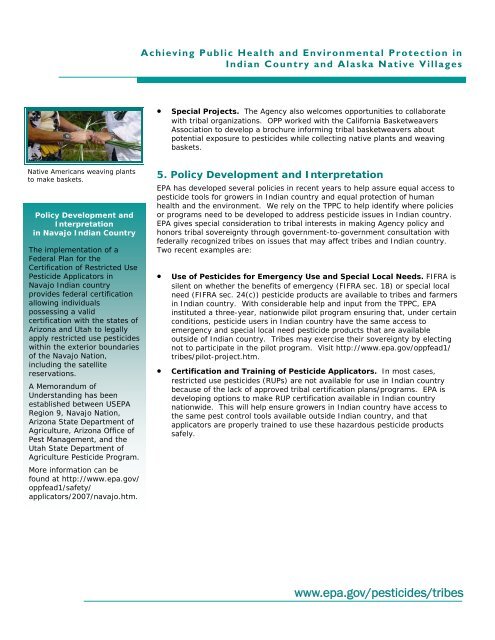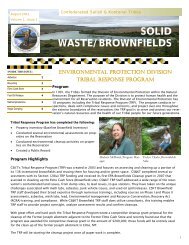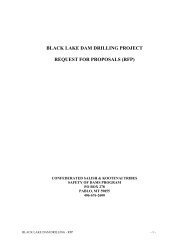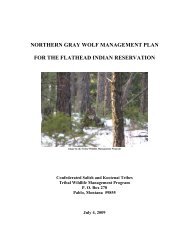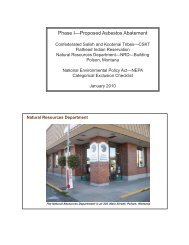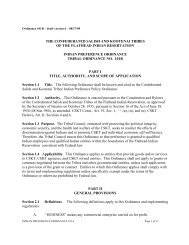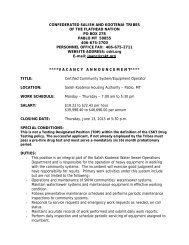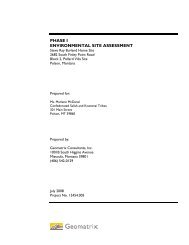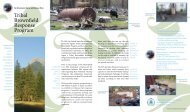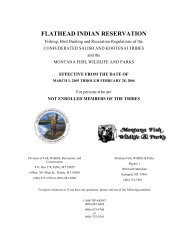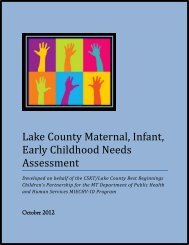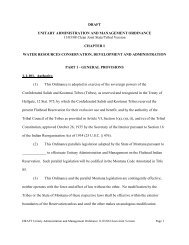US EPA - The National Pesticide Tribal Program - US Environmental ...
US EPA - The National Pesticide Tribal Program - US Environmental ...
US EPA - The National Pesticide Tribal Program - US Environmental ...
You also want an ePaper? Increase the reach of your titles
YUMPU automatically turns print PDFs into web optimized ePapers that Google loves.
Achieving Public Health and <strong>Environmental</strong> Protection in<br />
Indian Country and Alaska Native Villages<br />
• Special Projects. <strong>The</strong> Agency also welcomes opportunities to collaborate<br />
with tribal organizations. OPP worked with the California Basketweavers<br />
Association to develop a brochure informing tribal basketweavers about<br />
potential exposure to pesticides while collecting native plants and weaving<br />
baskets.<br />
Native Americans weaving plants<br />
to make baskets.<br />
Policy Development and <br />
Interpretation <br />
in Navajo Indian Country <br />
<strong>The</strong> implementation of a<br />
Federal Plan for the<br />
Certification of Restricted Use<br />
<strong>Pesticide</strong> Applicators in<br />
Navajo Indian country<br />
provides federal certification<br />
allowing individuals<br />
possessing a valid<br />
certification with the states of<br />
Arizona and Utah to legally<br />
apply restricted use pesticides<br />
within the exterior boundaries<br />
of the Navajo Nation,<br />
including the satellite<br />
reservations.<br />
A Memorandum of<br />
Understanding has been<br />
established between <strong>US</strong><strong>EPA</strong><br />
Region 9, Navajo Nation,<br />
Arizona State Department of<br />
Agriculture, Arizona Office of<br />
Pest Management, and the<br />
Utah State Department of<br />
Agriculture <strong>Pesticide</strong> <strong>Program</strong>.<br />
More information can be<br />
found at http://www.epa.gov/<br />
oppfead1/safety/<br />
applicators/2007/navajo.htm.<br />
5. Policy Development and Interpretation<br />
<strong>EPA</strong> has developed several policies in recent years to help assure equal access to<br />
pesticide tools for growers in Indian country and equal protection of human<br />
health and the environment. We rely on the TPPC to help identify where policies<br />
or programs need to be developed to address pesticide issues in Indian country.<br />
<strong>EPA</strong> gives special consideration to tribal interests in making Agency policy and<br />
honors tribal sovereignty through government-to-government consultation with<br />
federally recognized tribes on issues that may affect tribes and Indian country.<br />
Two recent examples are:<br />
• Use of <strong>Pesticide</strong>s for Emergency Use and Special Local Needs. FIFRA is<br />
silent on whether the benefits of emergency (FIFRA sec. 18) or special local<br />
need (FIFRA sec. 24(c)) pesticide products are available to tribes and farmers<br />
in Indian country. With considerable help and input from the TPPC, <strong>EPA</strong><br />
instituted a three-year, nationwide pilot program ensuring that, under certain<br />
conditions, pesticide users in Indian country have the same access to<br />
emergency and special local need pesticide products that are available<br />
outside of Indian country. Tribes may exercise their sovereignty by electing<br />
not to participate in the pilot program. Visit http://www.epa.gov/oppfead1/<br />
tribes/pilot-project.htm.<br />
• Certification and Training of <strong>Pesticide</strong> Applicators. In most cases,<br />
restricted use pesticides (RUPs) are not available for use in Indian country<br />
because of the lack of approved tribal certification plans/programs. <strong>EPA</strong> is<br />
developing options to make RUP certification available in Indian country<br />
nationwide. This will help ensure growers in Indian country have access to<br />
the same pest control tools available outside Indian country, and that<br />
applicators are properly trained to use these hazardous pesticide products<br />
safely.<br />
www.epa.gov/pesticides/tribes


